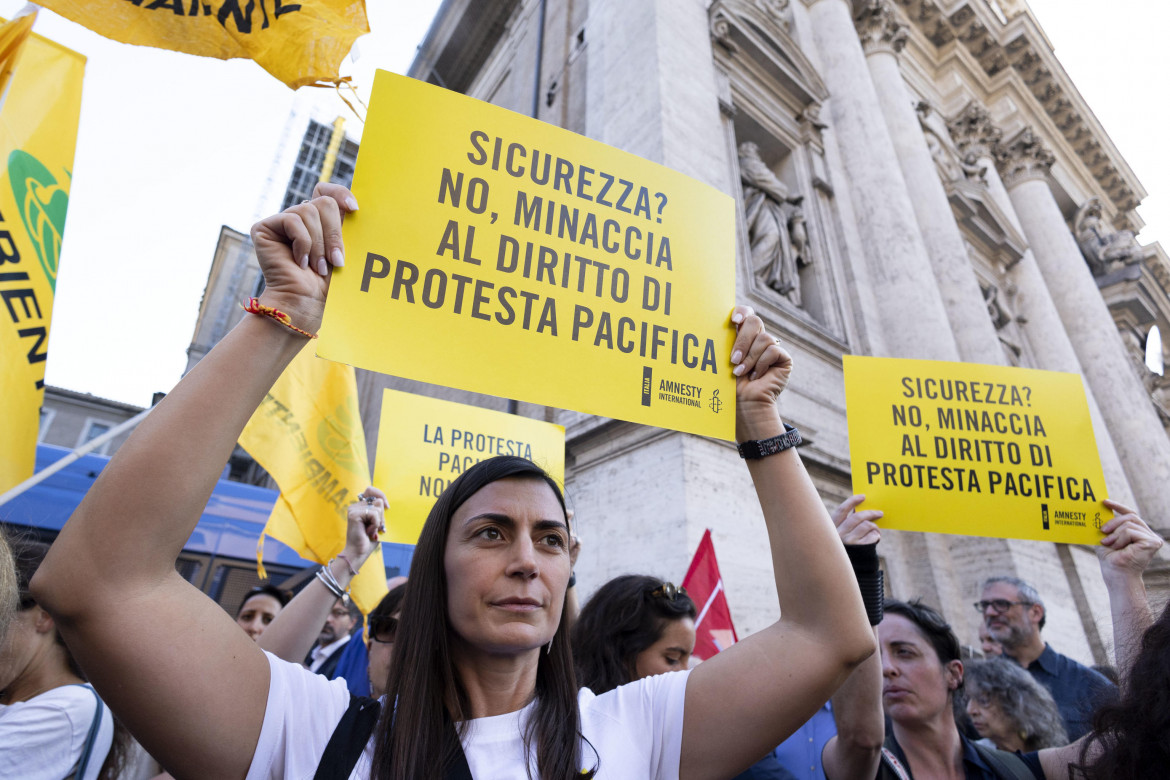Reportage
Experts testified that Italy’s Security Bill ‘borders on the ridiculous’
'Criminalization is being used as a symbolic token of reinforcing security, something that very often doesn’t survive close scrutiny, including in terms of effectiveness.'

They tore the Security Bill to shreds. On Tuesday afternoon, the first of the marathon hearings on the bill featured no less than 12 experts, including constitutional jurists, magistrates, lawyers and criminal justice experts, who testified before the senators of the joint Committees of Justice and Constitutional Affairs. The overwhelming message was a blanket rejection of Bill No. 1236. In the words of former Turin prosecutor Armando Spataro, one of those who testified, the bill contains “nothing new and a lot that is pointless.”
In the 20 minutes each of them had available, the experts didn’t have time to set out an exhaustive analysis of the “kitchen sink” text, as constitutional law professor Alfonso Celotto called it. Each of them pledged to send a more detailed written report later on, to fit with the mad rush of the timetable – which will include no more than about 30 hearings in all – forced by the governing parties that are trying to push their latest propaganda measure through as soon as possible. As Prof. Celotto (who teaches at Roma Tre University) said, this bill is the product of a “pan-penal” conception and puts forward “many small pieces without showing any overall vision.”
This assessment was in sharp contrast to Justice Minister Carlo Nordio’s boasts on Sky TG24 on Tuesday, where he claimed that “the Security Bill sought to fill regulatory and protection gaps regarding issues that had raised alarm in society.” Almost in unison, the experts heard and questioned by the senators from the committees stressed that the bill is completely useless for the purpose of increasing security in society.
For instance, former National Guarantor of Prisoners Mauro Palma pointed out that “there is the risk that criminalization is being used as a symbolic token of reinforcing security, something that very often doesn’t survive close scrutiny, including in terms of effectiveness.” He added that “we are witnessing a multiplication of crimes and aggravating circumstances, which are in part the result of the prominence of one particular event or another in the media, and of a popular reaction that was perhaps amplified by the same media.”
To give just one example, according to the former prosecutor – who is in favor of the provision to display the badge number on the uniforms of law enforcement agencies – “the provision by which they intend to modify the ‘obligations to identify users of mobile phone services and related sanctions,’ i.e. outlawing the sale of SIM cards to foreigners without residence permits, borders on the ridiculous. Another blow to their humanity. And there aren’t even phone booths anymore. I am shocked,” the magistrate added with a fair bit of irony, ”that under the same principle, there are no criminal penalties set out for anyone who lets an immigrant without a residence permit borrow their SIM card.” He concluded: “We need to stay away from any kind of populism.”
His admonitions were definitely wasted on those who have clearly adopted the saying “the lesser the welfare state, the bigger the penal state” (recalled by constitutional law professor Marco Ruotolo) as their agenda. On the day when the 74th inmate suicide since the beginning of the year was recorded in Vigevano prison, Ruotolo cited a long list of rulings in constitutional jurisprudence “that would warrant an in-depth parliamentary debate” on the bill, and asks if anyone ever did a study on the impact that the measures in the bill would have on prisons. No one answered, but we all know the answer to that question.
“The only measure able to increase security” in the bill “is the provision of bodycams,” said criminal law professor Gian Luigi Gatta in a cutting assessment. According to him, everything else “focuses on phenomena in which people living in socially marginalized contexts are criminalized as perpetrators,” and “at the same time provides a series of provisions in favor of the police.” Such as the crime of occupying real estate, which provides “a penalty of 2 to 7 years in prison, which is the same as for workplace homicides. Plainly disproportionate.” The bill is a grab bag of “new crimes that risk slowing down the criminal justice system right when we need to achieve the goals of the NRP by 2026.”
The 14 new crimes and 9 new aggravating circumstances, criminalizing disobedience and squatting, passive resistance and demonstrations against the construction of public works, “are likely to be rejected by the Supreme Court,” warned Prof. Gatta. Alessandra Algostin, who teaches Constitutional Law in Turin, explained why this is the case. In short, because it follows “the identity logic of the friend/enemy dichotomy” where the enemy is “social unease, dissent, and migrants,” “the provisions of the Bill do not have the character of generality and abstractness that a law needs to have,” she explained.
Then, there are articles, such as the one on property occupations, “written in such a way that I honestly don't understand it,” says Giovanni Salvi, a magistrate and former attorney general at the Supreme Court, pointing out the “elements of imprecision” that “will soon give rise to a judicial dispute that will bring further discredit on the judiciary. Because it will be impossible to apply this law,” he concluded.
Originally published at https://ilmanifesto.it/norme-al-limite-del-ridicolo-il-ddl-sicurezza-fatto-a-pezzi on 2024-10-09
